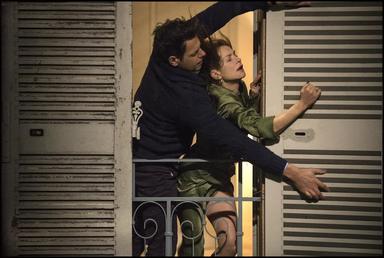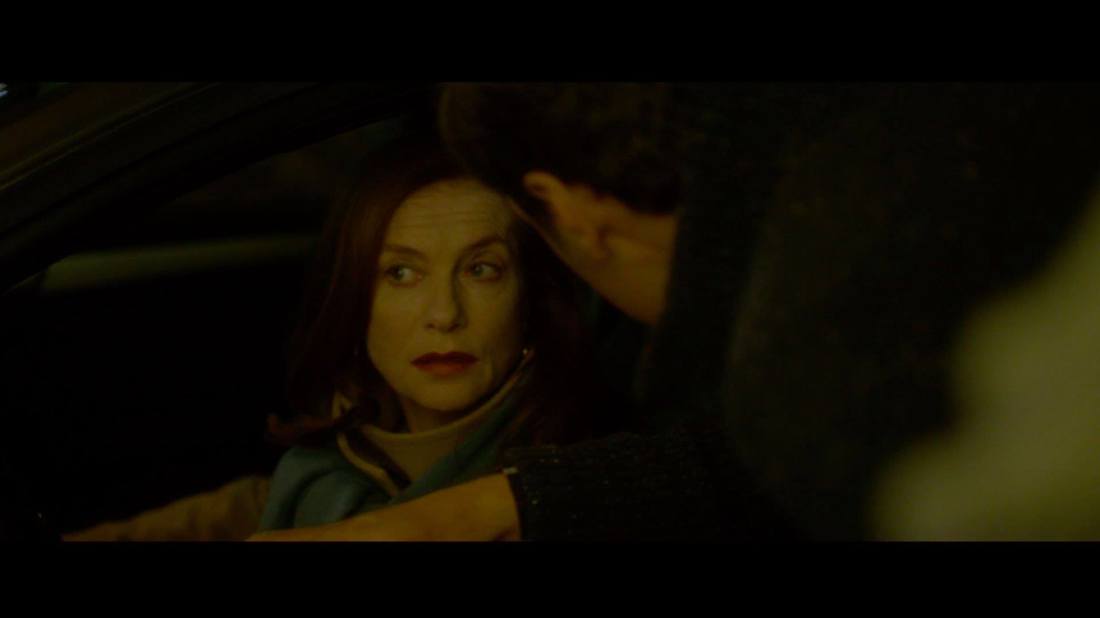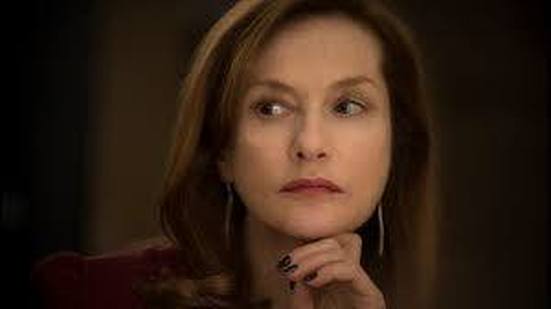With Pleasure: Female Sexuality and Feminism in the Post-Cinematic EraBy Megan Hess In the opinion of screenwriter Richard Donner, “most movies today are greenlit off the hormones of a twelve-year-old boy” with “collagen-lipped, balloon-breasted grotesques of femininity” instead of well-rounded female characters (Bordo 283). Paul Verhoeven’s Elle is not one of those movies. With an older female protagonist, Elle avoids the hypersexualization that often befalls leading women, and, although it has several romantic subplots, ends with Michele, the main character and her best friend, Anna, walking off, finalizing plans to live together after Anna ditched her philandering husband. All of these elements have caused certain critics to say that Elle is a feminist film - but, for all those in agreement with that point of view, there are just as many naysayers.

Whenever a movie with one or more substantial female roles is released, what I have named “the feminist problem” begins. Both pro and anti-feminist camps debate whether it is or is not “feminist” and pick the movie apart in search of clues to its stance rather than appreciating it as an intact object. While foisting a feminist interpretation on a work without a solid argument is not always helpful, self-identified feminist films should not be afraid to show their allegiance with the feminist agenda, even though it might alienate certain publics. (Miller, 2015) For example, when Mad Max: Fury Road (Miller, 2015) was upfront about its ideological leanings, with George Miller saying "Initially, there wasn’t a feminist agenda” (Kilday 1) at Cannes, it undoubtedly lost a little revenue from the “neomasculine” lifestyle website Return of Kings encouraging readership to boycott the film, but gained from other outlets promoting the film for its superb craftsmanship and depiction of gender equity. In contrast, Hulu’s new series based on Margaret Atwood’s acclaimed novel The Handmaid’s Tale avoided the term almost entirely and was lambasted for it in the press.
Elle disconnects itself from the “feminist problem”. In his review of Elle for The Guardian, Peter Bradshaw questions: “Is it post-feminist? Pre-feminist? Non-feminist? Perhaps the exclusion of that debate is part of its effect” (1). A.O Scott makes similar comments in his New York Times review: “After it’s over, you may find yourself in an argument about just what kind of movie you saw. A nasty, exploitative spectacle of a woman’s victimization, or the celebration of her resistance? A feminist tale of rape and revenge, or an exercise in chic, cynical misogyny?” (1). Elle’s refusal and inability to be pinned with a label is part of its pull. Yet, feminism does affect the film, albeit not explicitly. Specifically, adherence to certain feminist ideology impacts the viewer’s interpretation and what he or she believes it to be saying about female sexual empowerment, expression, and agency. Second-Wave: Elle as Victim In “Visual Pleasure and Narrative Cinema,” Laura Mulvey categorizes women as “images” and men as “bearers of the look” (715). The beginning of Elle stands true to that classification, as it opens through the “male gaze”- that of Michele’s cat, watching her get sexually violated by a stranger who just broke into her home. Instead of fearing the man who raped her, once she finds out his identity, Michele continues to associate with him. Why does she do this? She knows how to handle a difficult man because of her psychopathic father, a man known for a night of neighborhood slaughter? She’s used to being in control of men because of her job, the CEO of a male-dominated video game company? Richard Brody of the New Yorker would reject all these explanations for a far simpler one: Michele is, and always has been, a doormat.
In Brody’s view,“far from being a view of a strong woman who acknowledges and acts on her desire, “Elle” is a story of a lifelong victim, a character so exceptional and troubled that it thrusts both her desire and her actions into the realm of the anecdotal, the pathological, and the ridiculous” (Brody 1). All of her actions and decisions can be traced to her victimhood. Michele avoids reporting her rape to the police because of her past history with them. She blames them for her “victim” label, which she overcame. While Michele’s mother Irene stuck by her husband after his crime, Michele cut her father off and gained….at least, that’s how it looks to everyone around her. They see the single and successful career woman, or the cool-as-ice divorcee. In reality, Michele constantly regrets her divorce (even though she’s the one who instigated it, after her husband hit her one time), worries about her enabling, emotionally distant, relationship with her son, Vincent, and is so insecure in herself (i.e., her ability to catch a man) that, when she wants to, as she says to Anna near the close of the film, “get laid,”she begins an affair with her best friend’s husband. It is ironic that Michele critiques her mother for having relationships with younger men when she herself goes for married men - not once, but twice; after Richard, Michele starts in on her next-door neighbor, Patrick. That relationship turns out to be the most destructive of all, as Michele finds out Patrick is her rapist when he breaks into her home and attacks her a second time. Most second-wave feminists would not agree with Brody’s labeling Michele as a perpetual victim. They would applaud her for leaving her husband after an incident of domestic violence, and cheer the way she smashed through the gaming industry’s glass ceiling. However, like Brody, they would find her sex life problematic.While they would encourage Michele’s efforts to engage her sexuality as an older woman, but she is going about it with entirely the wrong people. Michele should not be sleeping with married men. After all, as the title of second-waver Robin Morgan’s best-selling feminist anthology reads, “sisterhood is powerful.” (Although, since Michele does not seem to care much for relationships with other women, I doubt this would be a convincing argument for her.) More importantly, she should cut Patrick out of her life. He already has power over her since he took sex from her by force; by neglecting to report him, never mind still speaking to and being intimate with him, Michele is disempowering herself and empowering him further. Ideally, romantic relationships should be give-and-take, but since “a rapist, by definition, is only interested in gratifying his own desires. A rapist doesn’t care what a woman wants. If he did, he wouldn’t rape” (Krakauer 104), what is she gaining? Perhaps Michele knows “sexual power is only one, very specific, type of power” (Levy 197). Furthermore, she really has the upper hand on Patrick. Not only could she report his sexual violence, but she knows a less legally damning, but equally ruinous secret: Patrick is unable to become aroused enough to perform the act of penetration unless the woman he plans to copulate with is unwilling. Michele learns of his repulsion at woman as autonomous sexual object when she and her son go to Patrick’s for dinner while his wife is out of town on a religious pilgrimage. When Vincent drinks too much and falls asleep on the sofa, Michele and Patrick go down to the basement, under the guise of Patrick showing her the wood stove system he uses to heat the house floors. Michele tries to seduce Patrick, but it doesn’t work until she realizes she has to be passive, and go through with Patrick’s rape fantasy. Although there are parts of Michele’s life worth emulating, through the eyes of second-wave feminists, her sexual escapades are not ones that they would promote. Instead of enhancing her life, they are only adding to its difficulty, and exacerbating pre-existing psychological problems. Ultimately, as Brody would say, “the character of Michèle is a cipher for sexual freedom….But that freedom is no achievement, it’s a curse, a residue of a lifetime of recurring trauma” (1). Third-Wave: Elle as Heroine Third-wave feminists would not argue with Brody’s assertion that Michele has had a traumatic past. However, unlike Richard Brody and the women of the second wave, who shame Michele for her sexual choices and pinpoint her victimization as the cause, A.O. Scott (and third-wave feminists) bypass all that to view her as “a competent, confident woman surrounded by fools” (Scott 1). For example, “an awful lot of her time and attention is devoted to handling the insecurities and emotional needs of men, a fact that counts as one of the film’s principal feminist insights” (Scott 1).” Furthermore, while they would acknowledge her sexual behaviors as risky, they would not condemn them in the same way as the prior generation of feminists. Because second-wave feminism was, unfortunately, branded as the ideology of choice for bra-burning, man-hating, radicals, as well as only concerned with the wants and needs of heterosexual middle-class white women, third-wave feminists seeked to make the movement more palatable. While many good things came out of this adaptability. The main area where second and third-wave feminists differ is sexuality. Both groups agree on the importance of female reproductive rights and easy access to accurate sex education and contraceptive methods, but they do not otherwise overlap. For example, third-wave feminism is more inclusive of alternative sexualities\gender expression. However, the point of difference that is most relevant to this paper has to do with what methods of female sexual expression are “empowering” or “objectifying.” Many third-wave feminists shocked their second-wave predecessors by wholeheartedly embracing pornography and strip clubs - the very industries they had crusaded against 20 years before. These environments had always been considered dangerously dehumanizing for women, but the third-wave women claimed to find them freeing, as long as participation was done by choice, and not by force. Journalist Ariel Levy has a name for these women who embrace sexism and call it self-empowerment in her 2005 book: “female chauvinist pigs.”
Stripping and porn do not show up in Elle, for the most part, and, although she does retain some elements of the FCP, Michele is not a classic “female chauvinist pig” by Levy’s definition. She diverges from them in age and appearance. While Levy’s female chauvinist pigs are traditionally younger women try to look cool and sexy at all times, Michele is no longer in her physical prime, and opts out of endeavors to gain male approval through her face and body. In “Visual Pleasure and Narrative Cinema,” Laura Mulvey discusses the concept of “to-be-looked-at-ness.” According to Mulvey, “in their traditional exhibitionist role, women are simultaneously looked at and displayed, with their appearance coded for strong visual and erotic impact so that they can be said to connote to-be-looked-at-ness” (715). This description does not fit Michele. First of all, as an older woman embracing her age, she slides under the radar of typical heterosexual male desire. More importantly, she actively avoids trying to draw attention to herself using her appearance. With a wardrobe of monochromatic neutrals - camel, blue, olive, black, white, and gray - minimal, unobtrusive makeup, and a low-maintenance hairstyle, Michele tries to make sure the “male gaze” never lands on her. In contrast, the FCP thrives under the male gaze spotlight. For all that Michele’s physical body does not fit into the FCP porn-star Barbie mold, her personality matches up to the model FCP. The goal of the FCP is to be “just one of the boys…” just hotter and sexier: all woman, except for her personality. The FCP disdains “girly-girls” with traditionally feminine interests - women who might look for liberation outside of Girls Gone Wild, or the neighborhood strip club. As one of the only women in a male-dominated company and field, Michele knows she has to act like the men underneath her to get respect from them. She seems nonplussed by tentacle porn shots in the latest game to be released by her company, and even tells her male developer to make the heroine’s cries more orgasmic. She is fine to be the pursuer in her romantic and sexual relationships as well. While second-wave feminists would look down on her choice of men to sleep with, third-wave feminists would not disdain her sexual choices. For them, the mantra “my body, my choice”goes beyond the abortion rights debate, and applies to sexual partners as well. If Michele feels empowered by these relationships, then she should not give them up. Conclusion No matter what lens the viewer takes on, the content of Elle does not change. However, the experience is what differs. If Michele is constantly a victim, the film has a misogynistic flavor. However, if she is an active agent, then it feels much more feminist and modern. Its lack of an identifiable agenda and openness to interpretation helps to convey its complex messages about female sexuality. Works Cited: Bordo, Susan. The Male Body: A New Look in Public and in Private. Farrar, Straus and Giroux, 1999 Bradshaw, Peter. “Elle review - startlingly strange rape-revenge black comedy” The Guardian. 9 March 2017. https://www.theguardian.com/film/2017/mar/09/elle-review-isabelle-huppert-paul-verhoeven-revenge Accessed 19 April 2017. Brody, Richard. “The Phony Sexual Transgressions of Paul Verhoeven’s ‘Elle’” The New Yorker. 15 November 2016. http://www.newyorker.com/culture/richard-brody/the-phony-sexual-transgressions-of-paul-verhoevens-elle Accessed 10 April 2017 Krakauer, Jon. Missoula: Rape and the Justice System in a College Town. Anchor Books, 2015 Kilday, Greg. “Cannes 2015: Mad Max’s Tom Hardy Says He Owes Director George Miller an Apology” The Hollywood Reporter. 14 May 2015. http://www.hollywoodreporter.com/news/cannes-2015-mad-maxs-tom-795589 Accessed 29 April 2017 Levy, Ariel. Female Chauvinist Pigs: Women and the Rise of Raunch Culture. Free Press, 2005 Mulvey, Laura. “Visual Pleasure and Narrative Cinema” Film Theory and Criticism, 7th ed. Oxford University Press, 2009, pp. 711-722 Scott, A.O. “Review: In ‘Elle,’ Isabelle Huppert Subverts the Role of Rape Victim” The New York Times. 10 November 2016. https://www.nytimes.com/2016/11/11/movies/elle-review-isabelle-huppert.html Accessed 10 April 2017 |




